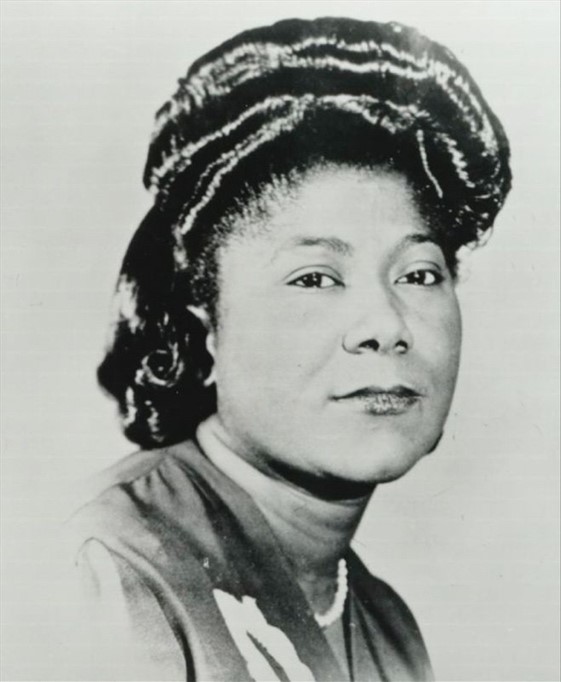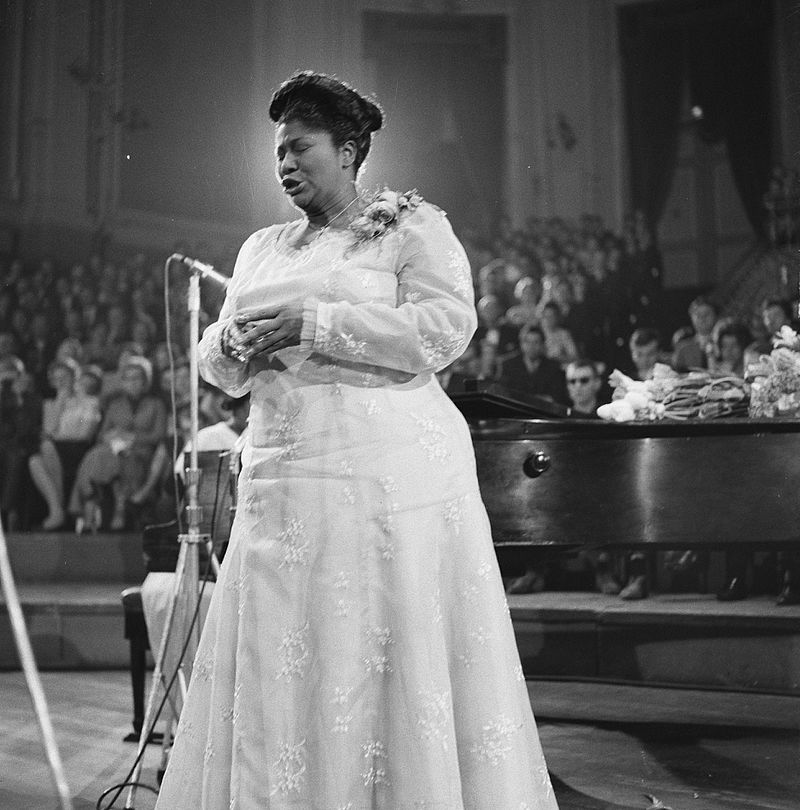
Mahalia Jackson
Thomas Dorsey was not the only seminal gospel music pioneer for whom Chicago was the final destination in the mass migration of Black people from the South. Mahalia Jackson (1912-72) arrived there in 1928 from New Orleans. Like Dorsey, she had embraced both sacred and secular music from childhood. Affiliated with the Baptist Church, with its "foot-tapping and hand-clapping," Mahalia's formative religious exposure also included the Pentecostal Church, whose music she loved. She recalls the great influence of the Pentecostal Church in her life:

I know now that a great influence in my life was the Sanctified or Holiness Churches we had in the South. I was always a Baptist, but there was a Sanctified Church right next door to our house in New Orleans …. Those people had no choir and no organ. They used the drum, the cymbal, the tambourine, and the steel triangle. Everybody in there sang and they clapped and stomped their feet and sang with their whole bodies. They had a beat, a powerful beat, a rhythm we held on to from slavery days, and their music was so strong and expressive it used to bring tears to my eyes.
(Jackson 1966, 32)

Although Mahalia's Aunt Duke, who parented her after her mother's death, did not sanction her listening to "worldly" or secular music, Jackson seized the opportunity to listen to her older cousin's blues collection whenever her aunt was not home. Her favorite performer was Bessie Smith: "I remember when I used to listen to Bessie Smith sing 'I Hate to See That Evening Sun Go Down,' I'd fix my mouth and try to make tones come out just like hers" (ibid., 36). Mahalia even speculates that, had her aunt not intervened, she might have otherwise been lured into the world of secular song. Yet, for Mahalia, the sacred and secular musical worlds, although related sonically, were separated by the opposite messages conveyed through their texts, as well as the kinds of inward responses they provoked:

People were always pestering me about becoming a blues singer. They'd tell me, 'Girl, you could become a great blues singer.' I'd answer, 'What Negro couldn't become a blues singer!' I'll never give up my gospel songs for the blues. Blues are the songs of despair, but gospel songs are the songs of hope. When you sing them, you are delivered of your burden. You have a feeling that there is a cure for what's wrong. It always gives me joy to sing gospel songs. I get to singing, and I feel better right away. When you get through with the blues, you've got nothing to rest on. I tell people that the person who sings only the blues is like someone in a deep pit yelling for help, and I'm simply not in that position.
(Jackson 1966, 72)

Stand By Me
When the storms of life are raging
Stand by me
When the storms of life are raging
Stand by me
When the world is tossing me
Like a ship out on the sea
Thou who rulest wind and water
Stand by me
Leave It There
If the world from you withhold of its silver and its gold,
And you have to get along with meager fare,
Just remember, in His Word, how He feeds the little bird,
Take your burden to the Lord and leave it there.
Leave it there, leave it there,
Take your burden to the Lord and leave it there.
If you trust and never doubt,
He will surely bring you out,
Take your burden to the Lord and leave it there.







